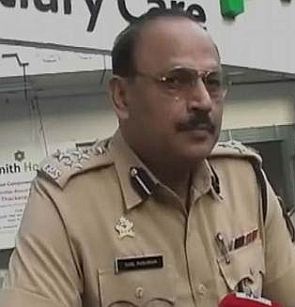
The politicisation of the police and a media that is biased due to management interference has started a dangerous trend, says N Suresh.
The case of Deputy Inspector General of Police Sunil Paraskar in Mumbai and the way the Shiv Sena rushed to his defence in the Saamna newspaper tells us a lot about the nexus between the police and politicians. It is a shame that it is happening openly, but honestly this is nothing new. It definitely sends a message to society that its safety and protection is not of importance compared to protecting the interests of those in authority.
The Shiv Sena is responsible for this parochialism that has deeply penetrated the Mumbai police force. It has been happening since the 1992-1993 Mumbai riots. This alienated the Muslim community and the effects of it can be seen even today. Later, the Maharashtrian versus other lobbies was given a political push within the police force, which then further splintered into Maratha versus others.
Political interference was also seen in the Khwaja Yunus case. Yunus was allegedly killed in police custody and his body was never found. Such was the conspiracy that the case has not been closed to date. The Bombay high court held nine policemen guilty. That most of them were Maharashtrian was a coincidence, but Narayan Rane, then a Shiv Sainik, made it out to be Marathi versus others.
Time and again we see the vicious proximity of police and politicians. It reminds me of the movie Maqbool, the adaptation of Macbeth by Vishal Bharadwaj. With changing times, only faces change, the odds are the same. In this game, the common citizen pays a heavy price.
Now take the case of the model who has accused DIG Paraskar of rape. First, she got involved with a senior police officer. In the eyes of the public, the odds weigh heavily against her. Popular perceptions of models are played upon -- she used a cop, had an 'affair,' equating to sleeping with him.
The places they visited are harped upon, how she trapped him. Then a chauvinistic political party stands firmly by the officer. Subtly it is put to the public -- first a snubbed affair, accepted as 'consensual.' So subtle that no one bothered to ask if the police officer did not breach professional conduct.
Instead we get reports of the guest houses the woman used to 'sleep' with the cop. The model's character assassination has taken place and the story is out of public memory.
What needs to focused upon is how a woman who has been used was let down by a cop. I want to know what favours he took, what promises he made. Paraskar breached the model's trust for which he needs to pay a price.
This vicious politicisation of the police and a media that is biased due to management interference has started a dangerous trend. Society as a whole is left vulnerable. Ultimately, the model will lose her reputation and will be compelled to settle for a 'compromise'. But worst of all, she will be left unprotected.
Don't be surprised if Paraskar quits the police force, joins the Shiv Sena and contests the next election.
Image: Deputy Inspector General of Police Sunil Paraskar.









